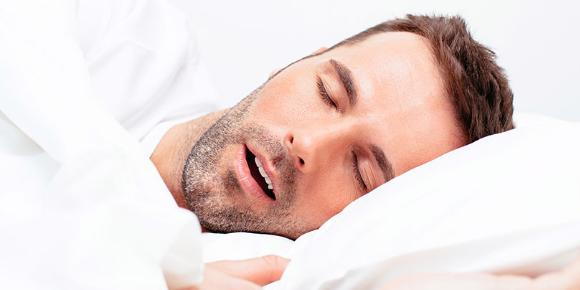
You’ve probably woken up with a parched mouth or a sore throat at some point, wondering if you’d been sleeping with your mouth open. While it might seem like a harmless habit, mouth breathing during sleep can have a range of effects on your health, from minor discomforts to more significant long-term consequences. Learn what you can do to prevent it.
Dry Mouth and Dehydration
One of the most immediate and noticeable effects of sleeping with your mouth open is dry mouth. Your saliva plays a crucial role in keeping your mouth hydrated, neutralizing acids produced by bacteria, and helping to wash away food particles. When you sleep with your mouth open, your mouth loses moisture quickly, leading to a dry, uncomfortable feeling when you wake up. Over time, persistent dry mouth can increase your risk of oral health problems, including bad breath, tooth decay, and gum disease. Saliva is your mouth’s natural defense mechanism, and without it, bacteria and plaque can build up more easily.
Increased Risk of Cavities & Gum Disease
As mentioned, saliva is essential for maintaining good oral health. It not only helps break down food but also neutralizes acids that can erode your tooth enamel. When you sleep with your mouth open, saliva production decreases, and your teeth become more vulnerable to acid attacks from bacteria. This can lead to an increased risk of cavities, as well as gum inflammation (gingivitis) and, in more severe cases, periodontal (gum) disease. Over time, mouth breathing can also contribute to enamel erosion, making your teeth more sensitive and prone to damage.
Bad Breath (Halitosis)
If you've ever noticed particularly bad breath in the morning, mouth breathing might be the culprit. A constantly dry mouth is an ideal environment for the harmful bacteria that cause bad breath to thrive. Without enough saliva to wash them away, these bacteria multiply, leading to a foul odor when you wake up. Regularly sleeping with your mouth open can result in chronic bad breath, even if you're diligent about your oral hygiene.
Poor Sleep Quality
Breathing through your mouth can actually affect the quality of your sleep. Mouth breathing is connected with snoring and sleep apnea. Both of these conditions can disrupt your sleeping cycle and leave you feeling tired the next day. Snoring occurs when air is obstructed as it passes through your mouth and throat, leading to the loud vibrations we know as snoring. In more serious cases, mouth breathing can be a symptom of obstructive sleep apnea. Sleep apnea is a condition where your airway becomes temporarily blocked during sleep, causing you to wake up multiple times throughout the night.
Poor sleep affects your energy levels and mood but can also have longer-term impacts on your overall health. This can increase the risk of conditions like heart disease, high blood pressure, and diabetes.
Changes in Facial Structure
Long-term mouth breathing can even affect the development and shape of your face—particularly in children. When you breathe through your mouth instead of your nose, it can cause changes in jaw alignment and the structure of your face over time. This is especially concerning during developmental years when children’s bones and muscles are still forming. Mouth breathing can lead to a narrow jaw, crowded teeth, and even changes in posture, as the body compensates for the altered breathing pattern. If left untreated, these structural changes may require orthodontic treatment to correct.
Decreased Oxygen Intake
Breathing through your nose is the body’s preferred way of taking in oxygen. Your nasal passages are designed to filter, humidify and warm the air before it reaches your lungs. When you breathe through your mouth, you bypass this natural process, and the air you take in is less filtered and often cooler and drier. Constant mouth breathing can reduce the amount of oxygen that reaches your lungs and bloodstream, leading to symptoms like fatigue, brain fog, and decreased concentration. Over time, this can have a negative impact on both your physical and mental performance.
Weakened Immune System
Your nose acts as a natural filter for airborne pathogens, trapping dust, allergens, and bacteria before they can enter your body. When you breathe through your mouth, these irritants have a more direct route to your lungs, increasing your risk of respiratory infections and allergies.
Additionally, a dry mouth can make you more susceptible to infections like sore throats, as saliva helps to flush out bacteria and viruses that can accumulate in your mouth and throat overnight.
How to Stop Sleeping with Your Mouth Open
If you regularly wake up with a dry mouth, sore throat, or notice other signs of mouth breathing, there are steps you can take to address the issue:
Address Nasal Congestion: If a stuffy nose is forcing you to breathe through your mouth at night, treating underlying allergies or sinus issues can help. Over-the-counter nasal sprays, humidifiers, and allergy medications may provide relief.
Consider a Mouth Guard or Chin Strap: Some people find that a mouth guard or chin strap helps keep their mouth closed while they sleep, promoting nasal breathing instead.
Practice Good Sleep Posture: Sleeping on your back or with your head elevated can encourage mouth breathing. Try sleeping on your side to help promote nasal breathing.
Consult a Doctor or Dentist: If you suspect you have sleep apnea or other sleep-related issues, it’s essential to consult a healthcare professional. A dentist may also be able to recommend a custom mouthguard to help with snoring and sleep apnea.
While sleeping with your mouth open might seem like a minor inconvenience, it can have far-reaching effects on your health—both in the short and long term. From increasing your risk of cavities and gum disease to affecting the quality of your sleep, mouth breathing is more than just a dry mouth in the morning. Contact us to schedule your visit or consultation today.
